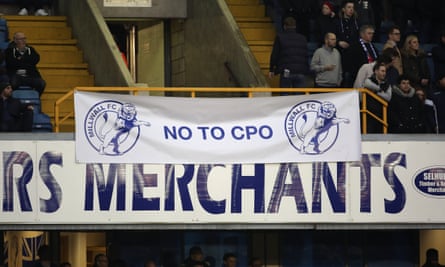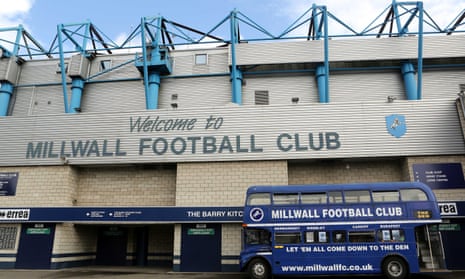Bermondsey has been called a few things over the years. For a while it was known as Biscuit Town, legacy of the Peek Freans years when south-east London supplied the world with garibaldis. During the second world war the Luftwaffe renamed Bermondsey and its surrounds Target Area G, shortly before flattening the place – although Millwall FC’s manager Bill Voisey did survive a direct hit on their ground, the Den, sitting late at night in his office.
Millwall, Bermondsey and a growing network of supporters have had cause for celebration this week in another battle. The first stage in a fierce campaigning victory for the club and its community came on Wednesday afternoon with the news that Lewisham council would be pulling the plug, for now, on an acrimonious compulsory purchase order (CPO) battle that has played out in a series of fevered civic meetings, a brilliantly conducted social media campaign and, increasingly, in these pages.
Once again, the urge to rename this distinct, standalone corner of inner-outer London has surfaced in the shape of a £1bn regeneration project known as New Bermondsey. Once again Target Area G has been under attack. And once again Bermondsey has resisted, this time against its own Labour council and their developer partners, an opaque offshore-registered entity called Renewal.
It has been a gripping narrative over the last few months, with a revolving cast of cameos and starring roles from an elected Labour mayor, a British Virgin Islands trust, an ex-Tory minister, Bananaman, Tim Farron, Gary Lineker, Danny Baker, “Swiss Tony” the financial investigator, and others too numerous to mention. Watching over it all has been the redoubtable, relentless Millwall AMS supporters’ group. And behind all this, just out of sight, a network of politicking and tangled interests.
At the end of which something good has happened. All being well, and barring any attempt to weasel out of the local authority’s promises, there will be no compulsory purchase of Millwall FC’s land and the surrounding community. Millwall are staying in south London. Locals such as 72-year-old Willow Winston, a cult hero of this entire sorry saga, will not be evicted from their homes for the benefit of opaque private developers.
Community resistance has been the key, as has scrutiny via the written press. The Guardian entered the picture last year, relatively late on into a story that had bubbled away in the background for four years. Millwall were first threatened with the CPO in 2012. Land around the Den would be needed to enable the “regeneration” scheme, a move that would, it later emerged, have threatened this slightly ragged, fond community club’s existence in its south London home.
Someone would surely step in and stop this. Nobody did. After much wrangling from club and fans the CPO was voted through by 6-1 by the Labour cabinet in September 2016. The land would then be sold on to Renewal, the developer who had recently also successfully applied for a £20m grant of public money from Boris Johnson’s mayoral housing zones scheme.
Except, looking more closely, some peculiar details began to appear. Renewal’s ownership is split between offshore companies in the British Virgin Islands and the Isle of Man. The company’s accounts revealed that one of Renewal’s founding directors and a part-owner until 2007 was Dave Sullivan, also the last Labour mayor of Lewisham and immediate predecessor to the incumbent, Sir Steve Bullock.
Renewal’s CEO, Mushtaq Malik, was also a former senior council officer, and ex colleague of the current chief executive, Barry Quirk. This looked, and still looks, odd. Sullivan told the Guardian he “must have sold” his shares in Renewal years before when the company was registered offshore. Everybody connected with Renewal has insisted repeatedly that there are no actual, material, live connections to Lewisham council, that it is all essentially just coincidence. Albeit in Lewisham’s own due diligence report produced by PriceWaterhouseCooper this same “longstanding relationship” with Malik is listed as a key factor in the viability of the entire scheme.
Things began to kick off. With a 25,000 petition in opposition, and supportive tweets from the likes of Lineker, confirmation of the land seizure was delayed after a heated council meeting. Rescheduled again, the order was delayed again as the Guardian published details of a sales document that seemed to suggest one part of the offshore developers had already been investigating the possibility of selling its interests on. A council investigation eventually dismissed the sales brochure as a private document prepared purely for the amusement of the estate agents. On we went.
Cracks began to appear in the Labour council between the old, Blair-era hierarchy and those on the left more concerned by such an arrangement. A hugely skilful and energetic social media campaign led by the Millwall AMS and Nick Hart of the Millwall CLB fanzine spread the message, recruiting a ragtag war-footing cabinet featuring a pro bono financial investigator known only as “Al” and later the redoubtable “Swiss Tony”, a freelance financial expert who simply cannot be called off and is even now, they say, digging at the meat of the scheme.

The excellent Rotten Boroughs column in Private Eye dug its fingers in, unearthing for the first time the suggestion from Millwall that the club really could be forced to leave London if the CPO proceeded, something the Guardian energetically expanded upon. In a bizarre intervention Danny Baker, celebrity Millwall fan, wished a potentially fatal disease on Lewisham council via Twitter. Classless and deeply wrong, obviously, but in an odd kind of way it broke the thing open. Suddenly readers of other newspapers knew about Millwall and Lewisham, even if it was couched in the outraged tones of an off-colour celebrity outburst.
Another CPO confirmation meeting was postponed, with Lewisham council buildings besieged by global media, flag-waving fans and rolling news cameras. By now it seemed quite clear nobody had expected this process to be subjected to this blizzard of joined-up scrutiny. When Millwall opened the original Den in 1910 the club was presented with a plaque by Lord Kinnaird that read “we shall never turn our backs on the enemy.” No kidding.
By now Renewal had begun to hit back. At its heart is a charitable company called Surrey Canal Sport Foundation, which exists to raise £40m to build a “sporting village” central to the scheme’s viability. Bullock, the Lewisham mayor, accepted a position as a director of this foundation, despite its involvement in Lewisham residents being evicted from their homes.
Steve Norris, former Tory rail minister, is the foundation’s chairman and co-director. Norris also works for Renewal’s PR company, London Communications, something he didn’t declare while writing to the Guardian to complain about our coverage of this project. The last line of Norris’s letter urged Guardian staff and readers to educate themselves by consulting the Renewal-backed foundation’s website.
It turned out to be an excellent piece of advice, albeit not perhaps in the way intended. Consulting the website revealed the words “£2m promised by Sport England” picked out in a large banner headline. This was an impressive piece of funding. But Sport England is also a serious organisation that only releases funds after a detailed vetting process. The “sporting village” was still just an idea, with no detailed designs. How could they have £2m already?
It turned out they didn’t. A funding application had been withdrawn in 2013. There was no funding agreement of any kind. Sport England had even written to the foundation, care of Renewal, asking them to stop using their name and to stop claiming to have £2m of funding promised.
The CPO of Millwall’s land began to deflate in earnest with publication of these facts in the Guardian.
In a bizarre aside, campaigners began to nickname Bullock “Mayor Bananaman” after it emerged the address of the foundation to which he put his name was previously listed on its website as 29 Acacia Road, an apparently unconnected location in north London that appears to be a version of the home address of the cartoon superhero.
The Charity Commission is assessing concerns about the foundation. The final stroke fell with the mayor’s own announcement that the CPO “should not proceed”, citing previously unnoticed concerns over Millwall’s community trust and the place of the club in the borough. Victory for now, of sorts. But the battle will continue until this promise of no CPO is enshrined in binding council policy.
Has anything corrupt happened here? There is no evidence yet to think so. The real issue seems to be the way the system functions. Lewisham itself is a one-party Labour state with an anomalously powerful elected mayor. Presumably local politics all over the country is riddled with similar decisions, processes that when held up to scrutiny would strike the average person from outside this bubble as genuinely startling.
The more surprising discovery has been the sheer mediocrity of some of the decision making and due diligence. Less surprising are the cosy relationships. Nick Cohen wrote in the New Statesman in 2000 about the reforms of local authorities in the Blair era, in which he asked: “Where is the dividing line between the politician and the businessman? Can anyone spot the difference?”
Cohen ended with a quote from Brendan Bird, one of the organisers of the Labour Campaign for Open Government: “If this is modern, why do all the good ol’ boys love it so?”
Perhaps they will do so a little less so now. In the words of one tongue-in-cheek, terrace-talk tweet after the CPO was abandoned this week: Congratulations Lewisham council. You have just met Millwall.








